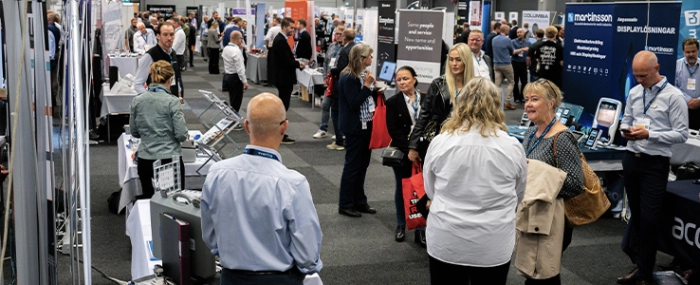
Evertiq Expo reaches new heights in Gothenburg
On September 19, Evertiq Expo Gothenburg reached new heights, setting a visitor record as the Swedish electronics industry gathered at the Swedish Exhibition & Congress Centre in Gothenburg.
With 145 exhibiting companies from 15 different countries, Evertiq Expo Gothenburg attracted 528 visitors from 282 different companies. A total of 427 companies were represented on the exhibition floor throughout the day.
On the floor, discussions ranged from familiar topics such as the current economic climate and challenges in scaling operations to new challenges such as how upcoming EU directives may impact businesses. Additionally, market development, order flow delays, and the disappointing outlook for 2024 were hot topics.
The state of the European EMS industry in 2024
Is the semiconductor shortage truly behind us, or were we misled altogether? According to data presented by Dieter Weiss from in4ma during the Expo, it may not have been a genuine shortage at all. Instead, he argues that much of the issue stemmed from behavioural errors within the industry itself.
Weiss's data shows that it was not a genuine shortage, but that panic buying by some parts of the industry created an illusion of increased demand – which did not exist.
EMS factories were running at full capacity, and companies experienced dramatic revenue increases in 2021-2022. However, Weiss noted that this was not normal, organic growth in production and order volumes. OEMs simply doubled their orders and are now sitting on excess inventory and currently don't need any support from the EMS companies. Basically, this means that the EMS produced orders then that should actually be produced today.
How the EU’s Cyber Resilience Act affects the market
The NIS2 directive is an updated EU legislation on cybersecurity that came into force in 2023. Together with the Cyber Resilience Act (CRA), it raises the bar for HMI and embedded systems to address new digital threats. NIS2 builds on previous regulations from 2016 and now encompasses more sectors, aiming to enhance the resilience of both public and private companies in managing cybersecurity incidents.
The CRA seeks to protect consumers and businesses using products or software with digital components. It aims to eliminate inadequate security features by introducing mandatory cybersecurity requirements for manufacturers and retailers.
Daniel Aspeskär from Martinsson Elektronik took the stage during the expo to discuss how these new EU security directives might impact the market.
Once the directive is in effect, internet-connected products will be CE-marked, indicating compliance with the new safety standards. The idea is also that harmonised rules for digital products will simplify compliance for manufacturers and help users make safer choices. This will entail new documentation and traceability requirements for the industry.
For suppliers, the CRA may lead to higher costs and longer development times, but it also opens up new business opportunities, as compliant products may become more attractive in the EU market.
Silicon carbide in Europe
Maurizio Ferrara from STMicroelectronics took the stage to explore the critical role that silicon carbide plays and will continue to play in the industry.
In the green transition, the demand for efficient and high-performance power semiconductors is greater than ever. Silicon carbide offers superior properties compared to conventional semiconductor materials like silicon, enabling the production of smaller, lighter, and more efficient electronic devices, particularly for applications requiring high current, high frequencies, or high-temperature tolerance.
ST aims to take a leading role in both the development and manufacturing of SiC-based technology, with a clear plan to achieve this goal.
In recent years, the industry has witnessed an unexpected increase in "End of Life" (EOL) components, surprising many. Component obsolescence is an unavoidable aspect of a sector driven by constant innovation. A single unavailable component can lead to significant economic issues – because, who wants an almost completed circuit board? Ronny Nietzsche from Rochester Electronics shared his insights on managing component obsolescence through proactive planning.
Evertiq would like to thank all participants — both exhibitors and visitors — and welcome everyone back next year on September 4, 2025. For those that can't wait that long, Evertiq will host several Expos in many different countries before that.


